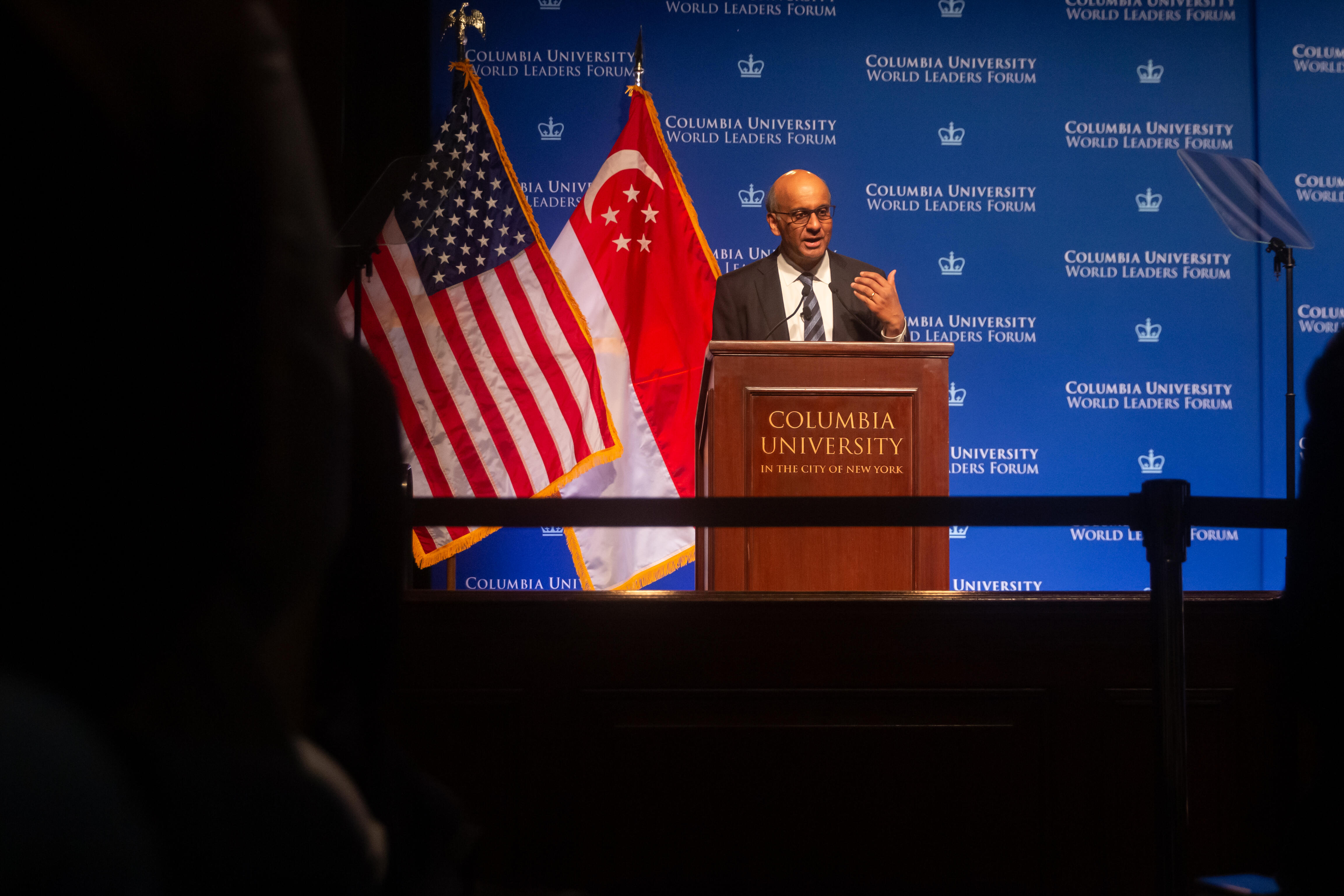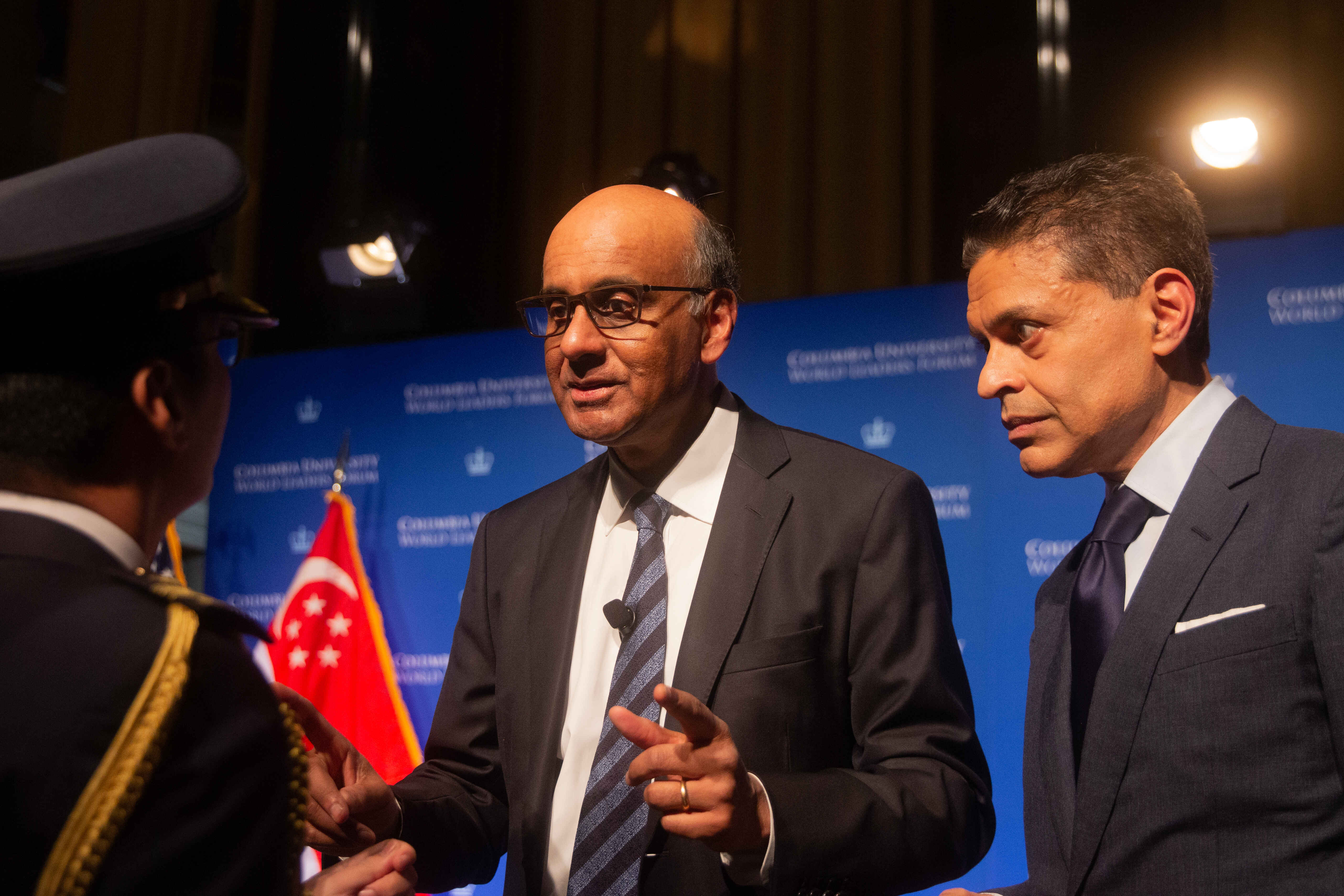新加坡總統尚達曼在 SIPA 的加布裏埃爾·西爾弗紀念講座上討論全球合作
https://www.columbiaspectator.com/news/2023/11/28/president-of-the-republic-of-singapore-tharman-shanmugaratnam-discuss-global-collaboration-at-sipas-gabriel-silver-memorial- 演講/
國際與公共事務學院的加布裏埃爾·西爾弗紀念講座成立於 1949 年,旨在促進更大的國際理解和世界和平。
作者:丹妮拉·奧斯皮諾·帕拉雷斯 • 2023 年 11 月 28 日
周二,世界領導人論壇在低圖書館圓形大廳舉行了新加坡共和國總統尚達曼與 CNN 主持人、《華盛頓郵報》專欄作家法裏德·紮卡裏亞之間的對話。
此次活動題為“建立共同點”,由國際與公共事務學院全球政治研究所共同主辦,是 SIPA 加布裏埃爾·西爾弗紀念講座係列的一部分。 據 WLF 網站稱,該講座成立於 1949 年,“目的是為了促進更多的國際理解和世界和平”。
大學校長米努什·沙菲克在介紹性發言中表示:“我們應該期待一位非常傑出的記者和一位長期任職的公務員和政治家之間就韌性、樂觀和尊重進行深思熟慮和深入的對話。”
在整個活動中,尚穆加拉特南強調,迫切需要通過促進各國之間的合作來積極應對全球挑戰,而不是僅僅在問題出現時做出反應。
尚穆加拉特南在介紹性演講中表示:“我們確實必須正視我們所處世界中強大的、破壞穩定的暗流——地緣政治、生態和社會。我們隻是在等待一場又一場危機的到來。”
尚穆加拉南呼籲各國之間建立更深層次的尊重和團結文化。
他說:“我們必須找到方法,讓世界各地的領導人將和平視為本國人民利益的關鍵,並認為隻有承認並尊重對方的需求,和平才有可能實現。”
CNN 主持人法裏德·紮卡裏亞 (Fareed Zakaria) 也加入了 Shanmugaratnam 的行列。 Shanmugaratnam 還討論了增加對突破性氣候可持續性技術投資的必要性。
“為了擁有更美好的未來,你今天要付出代價,”他指的是應對氣候變化的舊戰略。 “今天的可持續發展需要做出一些犧牲。 那是舊的想法。 我們現在知道,如果我們投資新的解決方案、新技術,就沒有真正的權衡。”
他認為,這些技術進步對於避免未來十五年地球係統出現臨界點是不可或缺的。
尚穆加拉特南表示:“這種轉型需要在較長時期內進行更高水平的投資。”
正如尚穆加拉特南所描述的那樣,大部分談話都圍繞著“基於規則的秩序”的持續侵蝕。 紮卡裏亞在講話中強調,有必要維持一個不陷入兩極分化的多極世界。
“解決方案似乎是美國本質上使用硬實力來威懾、打擊、扭轉這些破壞國際秩序的努力,”紮卡裏亞說。 “但這樣做會進一步分裂世界。 它迫使各國選邊站隊。 ……你怎麽穿這根針?”
尚穆加拉南表示,推動國際兩極分化需要集體組織。
他說:“我想說,要從各國的情況出發,著眼於他們的需求,並找到多邊組織方式或通過聯盟來滿足這些需求。”
SIPA 院長 Keren Yarhi-Milo 發表了閉幕詞,回顧了此次對話及其與係列講座“促進國際理解與世界和平”承諾的相關性。
亞裏-米洛說:“在像今晚這樣的對話中,真正可以看出的是我們生活在一個不確定的時代。” “我們需要更多像今天的客人一樣的領導人,致力於建立更具包容性的社會契約、激勵年輕人、反對兩極分化的領導人。”
President of the Republic of Singapore Tharman Shanmugaratnam discusses global collaboration at SIPA's Gabriel Silver Memorial Lecture
https://www.columbiaspectator.com/news/2023/11/28/president-of-the-republic-of-singapore-tharman-shanmugaratnam-discuss-global-collaboration-at-sipas-gabriel-silver-memorial-lecture/

The School of International and Public Affairs's Gabriel Silver Memorial Lecture was established in 1949 “to foster greater international understanding and world peace.”
The World Leaders Forum on Tuesday hosted a dialogue between Tharman Shanmugaratnam, president of the Republic of Singapore, and Fareed Zakaria, CNN host and the Washington Post columnist, in the Low Library Rotunda.
The event, titled “Building Common Ground,” was cosponsored by the School of International and Public Affairs’ Institute of Global Politics and held as part of the Gabriel Silver Memorial Lecture series at SIPA. The lecture was established in 1949 “to foster greater international understanding and world peace,” according to the WLF website.
"We should expect a thoughtful and incisive conversation about resilience, optimism, and respect between a very distinguished journalist and a long-time public servant and politician,” University President Minouche Shafik said during her introductory remarks.
Throughout the event, Shanmugaratnam emphasized the critical need to proactively address global challenges by fostering collaboration among nations, rather than merely reacting to them as they arise.
"We do have to look at the powerful, destabilizing undercurrents in the world we are in—geopolitical, ecological, and social,” Shanmugaratnam said during his introductory speech. “We are just waiting for one crisis after another to come.”
Shanmugaratnam called for a deeper culture of respect and unity among nations.
"We have to find ways in which around the world, leaders see peace as essential to the interests of their own people and see peace only possible if you acknowledge and respect what the other side needs,” he said.

Shanmugaratnam was joined by CNN host Fareed Zakaria. Shanmugaratnam also discussed the need for increased investment in breakthrough climate sustainability technologies.
“You pay a cost today in order to have a better future,” he said, referring to the old strategies of combating climate change. “Sustainability requires sacrificing something today. That was the old thinking. We now know that there is no true tradeoff if we invest in new solutions, new technologies.”
These technological advancements, he argued, are indispensable in avoiding tipping points in the earth system within the next decade and a half.
“That transition story requires higher levels of investment over a longer period of time,” Shanmugaratnam said.
Much of the conversation revolved around the continual erosion of a “rules-based order,” as Shanmugaratnam described it. Zakaria, in his remarks, emphasized the necessity of maintaining a multipolar world that does not devolve into polarization.
“The solution seems to be that the United States essentially uses hard power to deter, combat, reverse these efforts to fray the international order,” Zakaria said. “But in doing that, it divides the world more. It forces countries to pick sides. … How do you thread this needle?”
Shanmugaratnam said this push against international polarization requires collective organization.
“I would say start from where countries are, look at their needs, and find ways of organizing ourselves multilaterally, or through coalitions to address those needs,” he said.
SIPA Dean Keren Yarhi-Milo delivered the closing remarks, reflecting on the conversation and its relevance to the lecture series’ commitment to “fostering international understanding and world peace.”
“What really can come through in conversations like this evening’s is that we are living in uncertain times,” Yarhi-Milo said. “We need more leaders like our guests today, leaders committed to building more inclusive social compacts, lifting up young people, and opposing polarization.”






